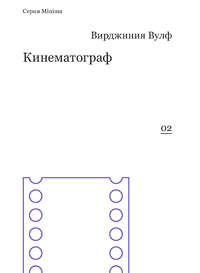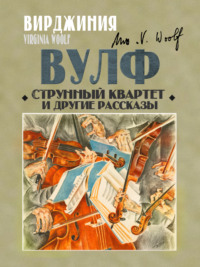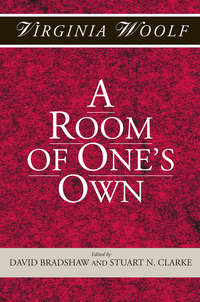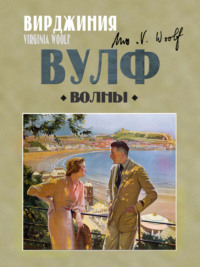 полная версия
полная версияJacob's Room
The evening air slightly moved the dirty curtains in the hotel window at Olympia.
"I am full of love for every one," thought Mrs. Wentworth Williams, " – for the poor most of all – for the peasants coming back in the evening with their burdens. And everything is soft and vague and very sad. It is sad, it is sad. But everything has meaning," thought Sandra Wentworth Williams, raising her head a little and looking very beautiful, tragic, and exalted. "One must love everything."
She held in her hand a little book convenient for travelling – stories by Tchekov – as she stood, veiled, in white, in the window of the hotel at Olympia. How beautiful the evening was! and her beauty was its beauty. The tragedy of Greece was the tragedy of all high souls. The inevitable compromise. She seemed to have grasped something. She would write it down. And moving to the table where her husband sat reading she leant her chin in her hands and thought of the peasants, of suffering, of her own beauty, of the inevitable compromise, and of how she would write it down. Nor did Evan Williams say anything brutal, banal, or foolish when he shut his book and put it away to make room for the plates of soup which were now being placed before them. Only his drooping bloodhound eyes and his heavy sallow cheeks expressed his melancholy tolerance, his conviction that though forced to live with circumspection and deliberation he could never possibly achieve any of those objects which, as he knew, are the only ones worth pursuing. His consideration was flawless; his silence unbroken.
"Everything seems to mean so much," said Sandra. But with the sound of her own voice the spell was broken. She forgot the peasants. Only there remained with her a sense of her own beauty, and in front, luckily, there was a looking-glass.
"I am very beautiful," she thought.
She shifted her hat slightly. Her husband saw her looking in the glass; and agreed that beauty is important; it is an inheritance; one cannot ignore it. But it is a barrier; it is in fact rather a bore. So he drank his soup; and kept his eyes fixed upon the window.
"Quails," said Mrs. Wentworth Williams languidly. "And then goat, I suppose; and then…"
"Caramel custard presumably," said her husband in the same cadence, with his toothpick out already.
She laid her spoon upon her plate, and her soup was taken away half finished. Never did she do anything without dignity; for hers was the English type which is so Greek, save that villagers have touched their hats to it, the vicarage reveres it; and upper-gardeners and under-gardeners respectfully straighten their backs as she comes down the broad terrace on Sunday morning, dallying at the stone urns with the Prime Minister to pick a rose – which, perhaps, she was trying to forget, as her eye wandered round the dining-room of the inn at Olympia, seeking the window where her book lay, where a few minutes ago she had discovered something – something very profound it had been, about love and sadness and the peasants.
But it was Evan who sighed; not in despair nor indeed in rebellion. But, being the most ambitious of men and temperamentally the most sluggish, he had accomplished nothing; had the political history of England at his finger-ends, and living much in company with Chatham, Pitt, Burke, and Charles James Fox could not help contrasting himself and his age with them and theirs. "Yet there never was a time when great men are more needed," he was in the habit of saying to himself, with a sigh. Here he was picking his teeth in an inn at Olympia. He had done. But Sandra's eyes wandered.
"Those pink melons are sure to be dangerous," he said gloomily. And as he spoke the door opened and in came a young man in a grey check suit.
"Beautiful but dangerous," said Sandra, immediately talking to her husband in the presence of a third person. ("Ah, an English boy on tour," she thought to herself.)
And Evan knew all that too.
Yes, he knew all that; and he admired her. Very pleasant, he thought, to have affairs. But for himself, what with his height (Napoleon was five feet four, he remembered), his bulk, his inability to impose his own personality (and yet great men are needed more than ever now, he sighed), it was useless. He threw away his cigar, went up to Jacob and asked him, with a simple sort of sincerity which Jacob liked, whether he had come straight out from England.
"How very English!" Sandra laughed when the waiter told them next morning that the young gentleman had left at five to climb the mountain. "I am sure he asked you for a bath?" at which the waiter shook his head, and said that he would ask the manager.
"You do not understand," laughed Sandra. "Never mind."
Stretched on the top of the mountain, quite alone, Jacob enjoyed himself immensely. Probably he had never been so happy in the whole of his life.
But at dinner that night Mr. Williams asked him whether he would like to see the paper; then Mrs. Williams asked him (as they strolled on the terrace smoking – and how could he refuse that man's cigar?) whether he'd seen the theatre by moonlight; whether he knew Everard Sherborn; whether he read Greek and whether (Evan rose silently and went in) if he had to sacrifice one it would be the French literature or the Russian?
"And now," wrote Jacob in his letter to Bonamy, "I shall have to read her cursed book" – her Tchekov, he meant, for she had lent it him.
Though the opinion is unpopular it seems likely enough that bare places, fields too thick with stones to be ploughed, tossing sea-meadows half-way between England and America, suit us better than cities.
There is something absolute in us which despises qualification. It is this which is teased and twisted in society. People come together in a room. "So delighted," says somebody, "to meet you," and that is a lie. And then: "I enjoy the spring more than the autumn now. One does, I think, as one gets older." For women are always, always, always talking about what one feels, and if they say "as one gets older," they mean you to reply with something quite off the point.
Jacob sat himself down in the quarry where the Greeks had cut marble for the theatre. It is hot work walking up Greek hills at midday. The wild red cyclamen was out; he had seen the little tortoises hobbling from clump to clump; the air smelt strong and suddenly sweet, and the sun, striking on jagged splinters of marble, was very dazzling to the eyes. Composed, commanding, contemptuous, a little melancholy, and bored with an august kind of boredom, there he sat smoking his pipe.
Bonamy would have said that this was the sort of thing that made him uneasy – when Jacob got into the doldrums, looked like a Margate fisherman out of a job, or a British Admiral. You couldn't make him understand a thing when he was in a mood like that. One had better leave him alone. He was dull. He was apt to be grumpy.
He was up very early, looking at the statues with his Baedeker.
Sandra Wentworth Williams, ranging the world before breakfast in quest of adventure or a point of view, all in white, not so very tall perhaps, but uncommonly upright – Sandra Williams got Jacob's head exactly on a level with the head of the Hermes of Praxiteles. The comparison was all in his favour. But before she could say a single word he had gone out of the Museum and left her.
Still, a lady of fashion travels with more than one dress, and if white suits the morning hour, perhaps sandy yellow with purple spots on it, a black hat, and a volume of Balzac, suit the evening. Thus she was arranged on the terrace when Jacob came in. Very beautiful she looked. With her hands folded she mused, seemed to listen to her husband, seemed to watch the peasants coming down with brushwood on their backs, seemed to notice how the hill changed from blue to black, seemed to discriminate between truth and falsehood, Jacob thought, and crossed his legs suddenly, observing the extreme shabbiness of his trousers.
"But he is very distinguished looking," Sandra decided.
And Evan Williams, lying back in his chair with the paper on his knees, envied them. The best thing he could do would be to publish, with Macmillans, his monograph upon the foreign policy of Chatham. But confound this tumid, queasy feeling – this restlessness, swelling, and heat – it was jealousy! jealousy! jealousy! which he had sworn never to feel again.
"Come with us to Corinth, Flanders," he said with more than his usual energy, stopping by Jacob's chair. He was relieved by Jacob's reply, or rather by the solid, direct, if shy manner in which he said that he would like very much to come with them to Corinth.
"Here is a fellow," thought Evan Williams, "who might do very well in politics."
"I intend to come to Greece every year so long as I live," Jacob wrote to Bonamy. "It is the only chance I can see of protecting oneself from civilization."
"Goodness knows what he means by that," Bonamy sighed. For as he never said a clumsy thing himself, these dark sayings of Jacob's made him feel apprehensive, yet somehow impressed, his own turn being all for the definite, the concrete, and the rational.
Nothing could be much simpler than what Sandra said as she descended the Acro-Corinth, keeping to the little path, while Jacob strode over rougher ground by her side. She had been left motherless at the age of four; and the Park was vast.
"One never seemed able to get out of it," she laughed. Of course there was the library, and dear Mr. Jones, and notions about things. "I used to stray into the kitchen and sit upon the butler's knees," she laughed, sadly though.
Jacob thought that if he had been there he would have saved her; for she had been exposed to great dangers, he felt, and, he thought to himself, "People wouldn't understand a woman talking as she talks."
She made little of the roughness of the hill; and wore breeches, he saw, under her short skirts.
"Women like Fanny Elmer don't," he thought. "What's-her-name Carslake didn't; yet they pretend…"
Mrs. Williams said things straight out. He was surprised by his own knowledge of the rules of behaviour; how much more can be said than one thought; how open one can be with a woman; and how little he had known himself before.
Evan joined them on the road; and as they drove along up hill and down hill (for Greece is in a state of effervescence, yet astonishingly clean-cut, a treeless land, where you see the ground between the blades, each hill cut and shaped and outlined as often as not against sparkling deep blue waters, islands white as sand floating on the horizon, occasional groves of palm trees standing in the valleys, which are scattered with black goats, spotted with little olive trees and sometimes have white hollows, rayed and criss-crossed, in their flanks), as they drove up hill and down he scowled in the corner of the carriage, with his paw so tightly closed that the skin was stretched between the knuckles and the little hairs stood upright. Sandra rode opposite, dominant, like a Victory prepared to fling into the air.
"Heartless!" thought Evan (which was untrue).
"Brainless!" he suspected (and that was not true either). "Still…!" He envied her.
When bedtime came the difficulty was to write to Bonamy, Jacob found.
Yet he had seen Salamis, and Marathon in the distance. Poor old Bonamy!
No; there was something queer about it. He could not write to Bonamy.
"I shall go to Athens all the same," he resolved, looking very set, with this hook dragging in his side.
The Williamses had already been to Athens.
Athens is still quite capable of striking a young man as the oddest combination, the most incongruous assortment. Now it is suburban; now immortal. Now cheap continental jewellery is laid upon plush trays. Now the stately woman stands naked, save for a wave of drapery above the knee. No form can he set on his sensations as he strolls, one blazing afternoon, along the Parisian boulevard and skips out of the way of the royal landau which, looking indescribably ramshackle, rattles along the pitted roadway, saluted by citizens of both sexes cheaply dressed in bowler hats and continental costumes; though a shepherd in kilt, cap, and gaiters very nearly drives his herd of goats between the royal wheels; and all the time the Acropolis surges into the air, raises itself above the town, like a large immobile wave with the yellow columns of the Parthenon firmly planted upon it.
The yellow columns of the Parthenon are to be seen at all hours of the day firmly planted upon the Acropolis; though at sunset, when the ships in the Piraeus fire their guns, a bell rings, a man in uniform (the waistcoat unbuttoned) appears; and the women roll up the black stockings which they are knitting in the shadow of the columns, call to the children, and troop off down the hill back to their houses.
There they are again, the pillars, the pediment, the Temple of Victory and the Erechtheum, set on a tawny rock cleft with shadows, directly you unlatch your shutters in the morning and, leaning out, hear the clatter, the clamour, the whip cracking in the street below. There they are.
The extreme definiteness with which they stand, now a brilliant white, again yellow, and in some lights red, imposes ideas of durability, of the emergence through the earth of some spiritual energy elsewhere dissipated in elegant trifles. But this durability exists quite independently of our admiration. Although the beauty is sufficiently humane to weaken us, to stir the deep deposit of mud – memories, abandonments, regrets, sentimental devotions – the Parthenon is separate from all that; and if you consider how it has stood out all night, for centuries, you begin to connect the blaze (at midday the glare is dazzling and the frieze almost invisible) with the idea that perhaps it is beauty alone that is immortal.
Added to this, compared with the blistered stucco, the new love songs rasped out to the strum of guitar and gramophone, and the mobile yet insignificant faces of the street, the Parthenon is really astonishing in its silent composure; which is so vigorous that, far from being decayed, the Parthenon appears, on the contrary, likely to outlast the entire world.
"And the Greeks, like sensible men, never bothered to finish the backs of their statues," said Jacob, shading his eyes and observing that the side of the figure which is turned away from view is left in the rough.
He noted the slight irregularity in the line of the steps which "the artistic sense of the Greeks preferred to mathematical accuracy," he read in his guide-book.
He stood on the exact spot where the great statue of Athena used to stand, and identified the more famous landmarks of the scene beneath.
In short he was accurate and diligent; but profoundly morose. Moreover he was pestered by guides. This was on Monday.
But on Wednesday he wrote a telegram to Bonamy, telling him to come at once. And then he crumpled it in his hand and threw it in the gutter.
"For one thing he wouldn't come," he thought. "And then I daresay this sort of thing wears off." "This sort of thing" being that uneasy, painful feeling, something like selfishness – one wishes almost that the thing would stop – it is getting more and more beyond what is possible – "If it goes on much longer I shan't be able to cope with it – but if some one else were seeing it at the same time – Bonamy is stuffed in his room in Lincoln's Inn – oh, I say, damn it all, I say," – the sight of Hymettus, Pentelicus, Lycabettus on one side, and the sea on the other, as one stands in the Parthenon at sunset, the sky pink feathered, the plain all colours, the marble tawny in one's eyes, is thus oppressive. Luckily Jacob had little sense of personal association; he seldom thought of Plato or Socrates in the flesh; on the other hand his feeling for architecture was very strong; he preferred statues to pictures; and he was beginning to think a great deal about the problems of civilization, which were solved, of course, so very remarkably by the ancient Greeks, though their solution is no help to us. Then the hook gave a great tug in his side as he lay in bed on Wednesday night; and he turned over with a desperate sort of tumble, remembering Sandra Wentworth Williams with whom he was in love.
Next day he climbed Pentelicus.
The day after he went up to the Acropolis. The hour was early; the place almost deserted; and possibly there was thunder in the air. But the sun struck full upon the Acropolis.
Jacob's intention was to sit down and read, and, finding a drum of marble conveniently placed, from which Marathon could be seen, and yet it was in the shade, while the Erechtheum blazed white in front of him, there he sat. And after reading a page he put his thumb in his book. Why not rule countries in the way they should be ruled? And he read again.
No doubt his position there overlooking Marathon somehow raised his spirits. Or it may have been that a slow capacious brain has these moments of flowering. Or he had, insensibly, while he was abroad, got into the way of thinking about politics.
And then looking up and seeing the sharp outline, his meditations were given an extraordinary edge; Greece was over; the Parthenon in ruins; yet there he was.
(Ladies with green and white umbrellas passed through the courtyard – French ladies on their way to join their husbands in Constantinople.)
Jacob read on again. And laying the book on the ground he began, as if inspired by what he had read, to write a note upon the importance of history – upon democracy – one of those scribbles upon which the work of a lifetime may be based; or again, it falls out of a book twenty years later, and one can't remember a word of it. It is a little painful. It had better be burnt.
Jacob wrote; began to draw a straight nose; when all the French ladies opening and shutting their umbrellas just beneath him exclaimed, looking at the sky, that one did not know what to expect – rain or fine weather?
Jacob got up and strolled across to the Erechtheum. There are still several women standing there holding the roof on their heads. Jacob straightened himself slightly; for stability and balance affect the body first. These statues annulled things so! He stared at them, then turned, and there was Madame Lucien Grave perched on a block of marble with her kodak pointed at his head. Of course she jumped down, in spite of her age, her figure, and her tight boots – having, now that her daughter was married, lapsed with a luxurious abandonment, grand enough in its way, into the fleshy grotesque; she jumped down, but not before Jacob had seen her.
"Damn these women – damn these women!" he thought. And he went to fetch his book which he had left lying on the ground in the Parthenon.
"How they spoil things," he murmured, leaning against one of the pillars, pressing his book tight between his arm and his side. (As for the weather, no doubt the storm would break soon; Athens was under cloud.)
"It is those damned women," said Jacob, without any trace of bitterness, but rather with sadness and disappointment that what might have been should never be.
(This violent disillusionment is generally to be expected in young men in the prime of life, sound of wind and limb, who will soon become fathers of families and directors of banks.)
Then, making sure that the Frenchwomen had gone, and looking cautiously round him, Jacob strolled over to the Erechtheum and looked rather furtively at the goddess on the left-hand side holding the roof on her head. She reminded him of Sandra Wentworth Williams. He looked at her, then looked away. He looked at her, then looked away. He was extraordinarily moved, and with the battered Greek nose in his head, with Sandra in his head, with all sorts of things in his head, off he started to walk right up to the top of Mount Hymettus, alone, in the heat.
That very afternoon Bonamy went expressly to talk about Jacob to tea with Clara Durrant in the square behind Sloane Street where, on hot spring days, there are striped blinds over the front windows, single horses pawing the macadam outside the doors, and elderly gentlemen in yellow waistcoats ringing bells and stepping in very politely when the maid demurely replies that Mrs. Durrant is at home.
Bonamy sat with Clara in the sunny front room with the barrel organ piping sweetly outside; the water-cart going slowly along spraying the pavement; the carriages jingling, and all the silver and chintz, brown and blue rugs and vases filled with green boughs, striped with trembling yellow bars.
The insipidity of what was said needs no illustration – Bonamy kept on gently returning quiet answers and accumulating amazement at an existence squeezed and emasculated within a white satin shoe (Mrs. Durrant meanwhile enunciating strident politics with Sir Somebody in the back room) until the virginity of Clara's soul appeared to him candid; the depths unknown; and he would have brought out Jacob's name had he not begun to feel positively certain that Clara loved him – and could do nothing whatever.
"Nothing whatever!" he exclaimed, as the door shut, and, for a man of his temperament, got a very queer feeling, as he walked through the park, of carriages irresistibly driven; of flower beds uncompromisingly geometrical; of force rushing round geometrical patterns in the most senseless way in the world. "Was Clara," he thought, pausing to watch the boys bathing in the Serpentine, "the silent woman? – would Jacob marry her?"
But in Athens in the sunshine, in Athens, where it is almost impossible to get afternoon tea, and elderly gentlemen who talk politics talk them all the other way round, in Athens sat Sandra Wentworth Williams, veiled, in white, her legs stretched in front of her, one elbow on the arm of the bamboo chair, blue clouds wavering and drifting from her cigarette.
The orange trees which flourish in the Square of the Constitution, the band, the dragging of feet, the sky, the houses, lemon and rose coloured – all this became so significant to Mrs. Wentworth Williams after her second cup of coffee that she began dramatizing the story of the noble and impulsive Englishwoman who had offered a seat in her carriage to the old American lady at Mycenae (Mrs. Duggan) – not altogether a false story, though it said nothing of Evan, standing first on one foot, then on the other, waiting for the women to stop chattering.
"I am putting the life of Father Damien into verse," Mrs. Duggan had said, for she had lost everything – everything in the world, husband and child and everything, but faith remained.
Sandra, floating from the particular to the universal, lay back in a trance.
The flight of time which hurries us so tragically along; the eternal drudge and drone, now bursting into fiery flame like those brief balls of yellow among green leaves (she was looking at orange trees); kisses on lips that are to die; the world turning, turning in mazes of heat and sound – though to be sure there is the quiet evening with its lovely pallor, "For I am sensitive to every side of it," Sandra thought, "and Mrs. Duggan will write to me for ever, and I shall answer her letters." Now the royal band marching by with the national flag stirred wider rings of emotion, and life became something that the courageous mount and ride out to sea on – the hair blown back (so she envisaged it, and the breeze stirred slightly among the orange trees) and she herself was emerging from silver spray – when she saw Jacob. He was standing in the Square with a book under his arm looking vacantly about him. That he was heavily built and might become stout in time was a fact.
But she suspected him of being a mere bumpkin.
"There is that young man," she said, peevishly, throwing away her cigarette, "that Mr. Flanders."
"Where?" said Evan. "I don't see him."
"Oh, walking away – behind the trees now. No, you can't see him. But we are sure to run into him," which, of course, they did.
But how far was he a mere bumpkin? How far was Jacob Flanders at the age of twenty-six a stupid fellow? It is no use trying to sum people up. One must follow hints, not exactly what is said, nor yet entirely what is done. Some, it is true, take ineffaceable impressions of character at once. Others dally, loiter, and get blown this way and that. Kind old ladies assure us that cats are often the best judges of character. A cat will always go to a good man, they say; but then, Mrs. Whitehorn, Jacob's landlady, loathed cats.









